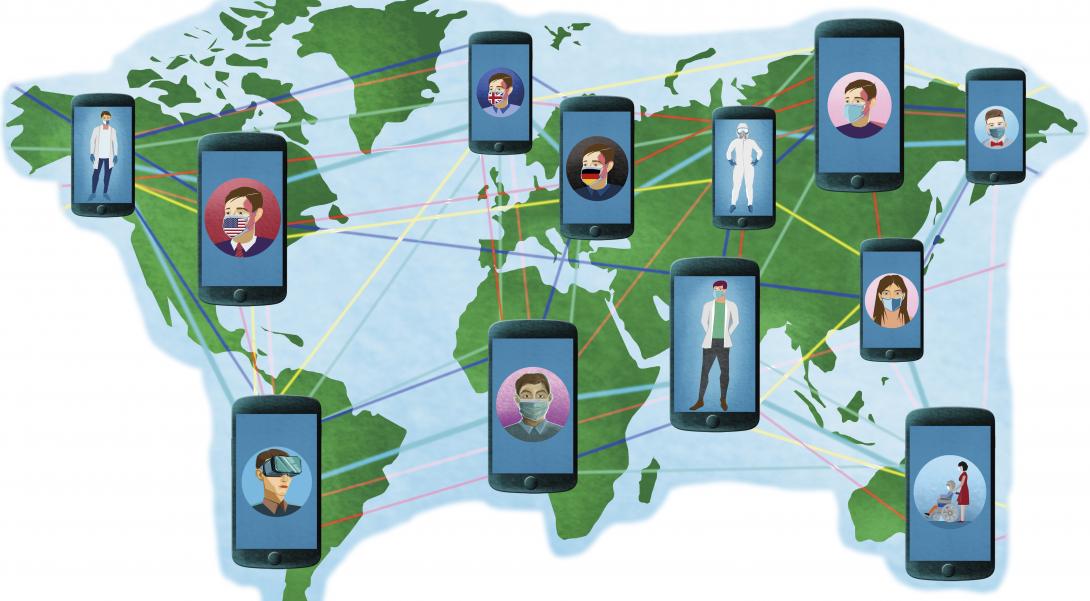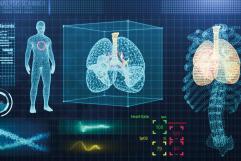
A whatsapp group brings together 800 medical professionals to share information
Dr. Carlos Ballesta, the Coordinator for the Independent Covid international Group
In the recent months of pandemic, a whatsapp group has become a key information tool for doctors all over the world. Last March, at the start of the lockdown, Doctor Carlos Ballesta proposed opening a group on the popular social media messaging service to his medical colleagues, aimed at sharing true and proven scientific information about the new coronavirus that caused Covid-19.
“It was a new virus, about which we knew almost nothing and we didn’t know how it would evolve. The group allowed us first hand access to scientific information in many different countries,” Doctor Ballesta, Coordinator of the Independent Covid International Group recalls. Currently, there are over 800 professionals, some representing other groups from different countries. The forum, which in the beginning was called ‘Amigos médicos’ (Doctor friends), changed to ‘Memoria de Marco Merma’ (In memoriam for Marco Merma), a memorial tribute to a 40 year old surgeon from Lima (Peru), one of Doctor Ballesta’s protégés, who worked on the frontline and died from Covid-19.
“The members of the group took the idea very seriously and they shared very interesting data,” Doctor Ballesta indicates. Thanks to the whatsapp group, “we gained access to data a month or 20 days before it became public,” he adds “and we shared it with managers and directors of different hospitals, with me doing so in Spain and other colleagues doing the same in their respective countries.” And the fact is that during the months of the first wave, between 30 and 40 articles were added every day, of which Doctor Ballesta selected the three or four most relevant ones. “On whatsapp there were no filters, but there was a commitment to seriousness and scientific rigour.”
Aerosols and face masks
“In this pandemic, doctors have had to improvise a great deal,” the doctor acknowledges. “Normally, a scientific article takes between one and three years to be published, because different doctors on the magazine’s editorial board read it and review it. But given the highly chaotic, avalanching situation, this rigour could not always be kept up, in such a way that priority was given to information when the participants in the group honestly saw that it could be interesting,” Ballesta affirms. For this reason, at times, “we have said things first and then we have had to rectify.”
The group has allowed information to be shared from the first moment. “We have known about the subject of aerosols since March. If you walk along the street and you cross paths with an ill person, whether you are wearing a mask or not, the risk of becoming infected is 3%, but if you are in a closed room, with air conditioning and without a mask, the risk rises to 90%,” Doctor Ballesta explains. “Now it seems that the media are explaining it better. Another subject is the type of mask used: the cloth ones you see in the street are useless. The size of the virus and the permeability of the fabric have to be measured. In the street, a surgical mask is sufficient, but in a hospital an FFP2 is needed.”
“We have been touching on many different topics. When we saw that we had to begin to operate, it was obvious that we had to separate those who were suspected of having Covid from those who did not. Covid and No-Covid circuits also had to be marked out, or a safety distance of two metres had to be kept to prevent contagion. Also, the fact that patients had to go to hospital without anyone accompanying them particularly in public hospitals, and if a companion had to enter, they could not leave again, because they could become infected outside and then infect the patient.”
New protocols
For Ballesta, one of the keys of the group is that no political slants are allowed. “The population in general has been given a great deal of politicised information,” he reports. “Information that was known to be false from the start, such as the fact that there was no risk of contagion in large concentrations of people. The data was hidden in order to put the interest of protesting over that of medicine. It is not good for doctors to go into politics,” he affirms.
After months of work and thanks to the knowledge generated by the group, a series of action protocols for hospitals have been established. “Once we brought out the rules, we sent them to all the medical staff. This allowed us to make intra-hospital protocols that were sent to the surgical societies in different countries, aimed at unifying the general criteria. For example, patients must not be operated on when there is a risk that they might need ICUs, unless these operations are urgent or due to cancer,” according to Doctor Ballesta, who recalls other protocols performed such as that of x-ray protocols. Additionally the chat offered “statistics and diagnosis methods, as well as other protocols where we advised avoiding closed places with air conditioning; we recommended the safety distance and we warned about contamination routes and viral persistence. All of this information has allowed us, anonymously, to help the different hospitals around the world to improve their care quality.
After the first wave, Doctor Ballesta thought about closing the group, but they decided to keep it open, because there were members from countries that were still suffering from the ravages of the disease such as the USA and South America. “Now we receive between three and four articles and the truth is that the chat continues to be interesting every day. It has been a success from the medical point of view and highly useful knowledge for the doctors has been shared.”
Rigour and seriousness
“What surprised me most was the rigour and seriousness of the doctors. Although this should not surprise me,” Ballesta affirms. “To see how people acted and how useful the information they provided has been a great experience. These digital channels have inconceivable possibilities,” he adds. A rigour and seriousness that will be maintained in the chat now that we are in the middle of the second wave. “It is concerning, because we are going to enter a worse situation than the previous one without having replaced resources,” the doctor reports.
“We haven’t wanted to learn any- thing from the first wave. We still don’t have a committee of experts. We are going to end up all being infected, as happens with ‘flu, so you must have everything ready to ensure that the public health service doesn’t become overwhelmed. The idea is to do things using common sense and these are not being done,” he indicates.
“We are a small group of people who have tried to spread and filter information for society, with the aim of making it reach the hospitals. Everything we have learnt over these months, we have always passed on in the patients’ benefit,” Doctor Carlos Ballesta concludes.
Who is he?
Doctor Carlos Ballesta is the Director of the Laparoscopic Centre, a collaborator at the HLA Inmaculada de Granada and the HLC Moncloa de Madrid hospitals and he is the Assistant Doctor for General Surgery and the Digestive Tract at the Teknon Medical Centre. Since 1979, he has been a specialist in the Digestive Tract and he has been one of the promoters of surgical laparoscopy. Since 1992, he has trained over 655 laparoscopic surgeons in different countries and hospitals. The author and co-author of over 450 presentations and communications, his research has received important recognition in countries around the entire world.



